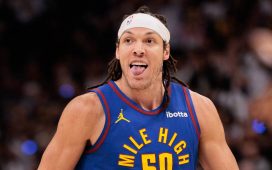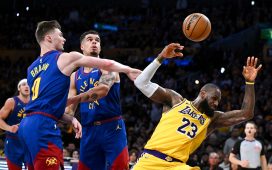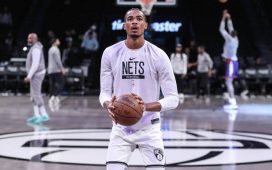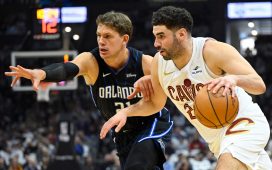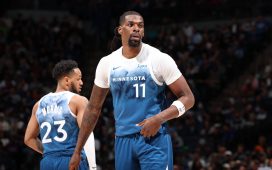The Lakers are a machine. Like the old Corolla that your mom didn’t want anymore, so she gave it to you. Wasn’t your birthday or anything; she was just done with the thing. The tread on the tires was cooked, but you were 17, you weren’t going to replace them, so you drove to school in the snow every morning in a single unbroken controlled skid, sticking to the quieter streets, avoiding inclines, getting in a little early so as to avoid any tricky parallel parking jobs. You were waiting for iceless spring, trying to keep the insurance bill down.
There’s not a dominant team left in these playoffs; perhaps that’s been the case this entire time, since the Clippers’ top speed remained theoretical in 2020, but you would probably make the Lakers favorites. They’ve got LeBron, and Anthony Davis, and a supporting cast that performs every other or third night. Kyle “Karl” Kuzma’s credentials as a third banana are vastly overstated, but he’s a fine player. Rondo, KCP, Alex Caruso: they will give you minutes, they will be on the floor for an amount of time, that’s a guarantee. Dwight Howard will do in a pinch. The ricketiness of L.A.’s championship-seeking venture is offset by the fact that anybody you might want to take over LeBron — you shouldn’t, but you’re an impressionable sort — has already crashed out of the postseason. (Nikola Jokić over LJ? Now there’s a choice that takes guts. Stake out that angle, aim for immortality.) There are no sure things, the Durant era Warriors are dead, but LeBron is going to put up 28, 11 and nine in a big game — really, that is about the floor on what he’s going to do. When the forecast says there’s a 70% chance of rain, you pack an umbrella.
I wrote last week about the Clippers’ lack of organizational heft, the city they don’t quite belong to, what feels true about them rather than what necessarily is, but it’s worth pointing out that Kawhi Leonard and Paul George, though they definitely did not grow up as Clippers fans, are at least from southern California and joined together in part because they wanted to come home. LeBron is in Los Angeles to keep a closer eye on his business interests, and Davis followed him because they share an agency and are, as they’re currently demonstrating, a powerful enough one-two punch to win a title.
The merits of a homegrown core are whatever you want them to be. False moral purity tends to come up a lot. You might recall the 2013 Spurs razzing the Heat with a Built vs. Bought billboard. Of course, all built means is acquiring talent through the draft, where players have no choice, rather than via free agency, where they do. But it is nice when stars, no matter how they ended up on their current franchise, stick around for a while and compose a history that spans more than a few sentences. When they’re still freshly arrived in a new locale, Seinfeld’s Laundry Theorem rears its ugly head. Don’t tell Lakers fans this, but if LeBron wins his fourth championship this year, it’s going to seem as much like a win for LeBron Enterprises, LLC as it is for the Lakers. And that’s okay. It can be both. Still a disorienting phenomenon. If it was not objectively better, when guys stayed in one city for their entire careers, or when they at least rarely moved, the ground beneath your feet was firmer. This year, I have forgotten, if only for a minute, that Russell Westbrook is on the Rockets, and that Jimmy Butler’s in Miami.
It’s not great, most facts aren’t: Kobe’s death has perfumed this Lakers season, creating an awkward situation in which LeBron and A.D. sometimes seem to be sharing the court with a wraith. It’s part Nike ad blitz, part quintessentially Lakers-y mythologizing, part genuine admiration and grief from guys he played with, or who grew up idolizing him. Kobe is everywhere but on this earth. Exploring what he has become in death is a whole other column, but practically speaking, he is what every meaningful moment of this Lakers championship run becomes about. (Because there is nothing else for it to be about.) Kobe showed up in Game 2, when Frank Vogel told his team that the contest was going to come down to (ugh) “offensive swag,” exhorting them to live up to the black snakeskin jerseys on their backs. And when Anthony Davis hit the game-winning three and called out his name. And when Vogel, in the locker room afterwards, called it a “Mamba Shot.” It was all for Kobe, and from him, skunked in his spirit. That was the company line, anyway.
It is enough to simply be a collection of guys trying to win a title, provided you have the requisite talent. That’ll get you where you need to go. But athletes like to tell themselves stories. It adds dimension to their triumphs and failures, their sense of self. It gets them out of bed and into the gym, on days when that’s a struggle. It helps the media, too, to be able to describe a team as at a certain point in a grand arc, possessing some universal character or purpose more literary than guys trying to win. There’s nothing wrong with characterless-ness, or a lack of narrative, but what lies beneath that pap is a discomfort with the mercenary and transactional nature of the professional sports, or perhaps even more discomfitingly, boredom. It’s never actually boring, though, to watch a team as good as the Lakers play basketball, especially against a team as good as the Nuggets. There just might be a lot less to it than is made to seem. These Lakers are a machine. Its imperfections—whether the next corner it takes will be its last — are the story.
